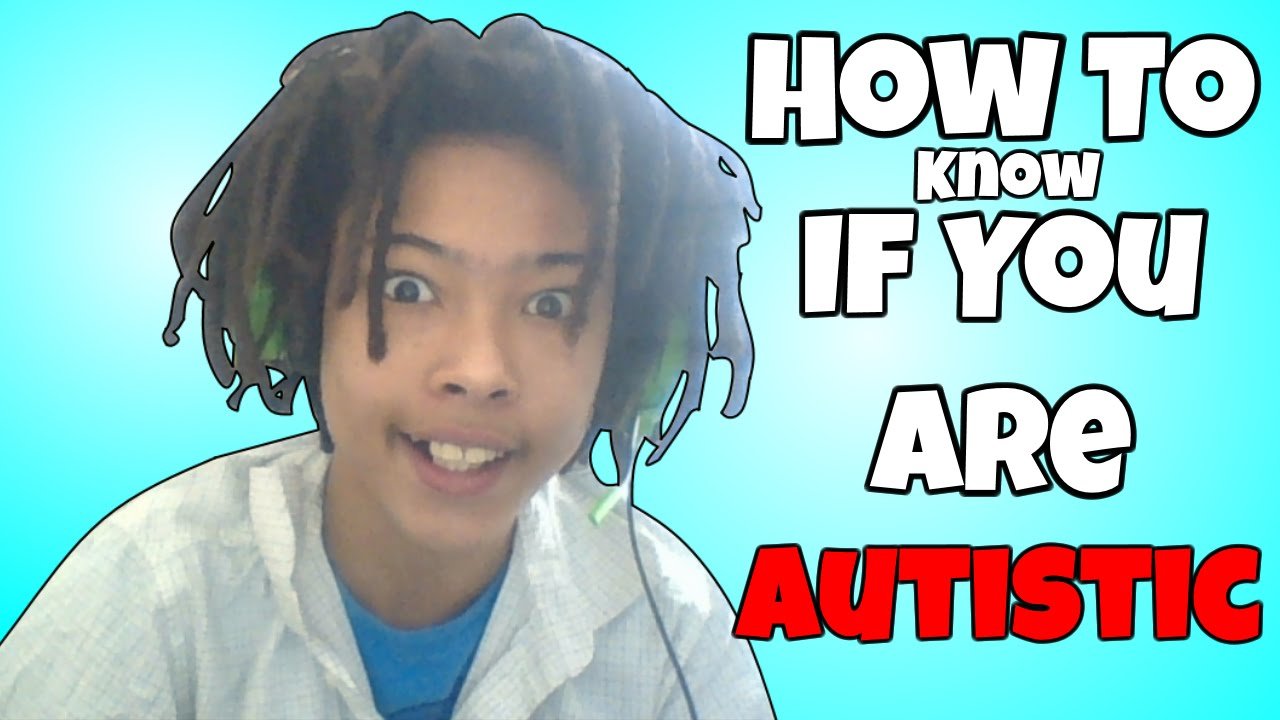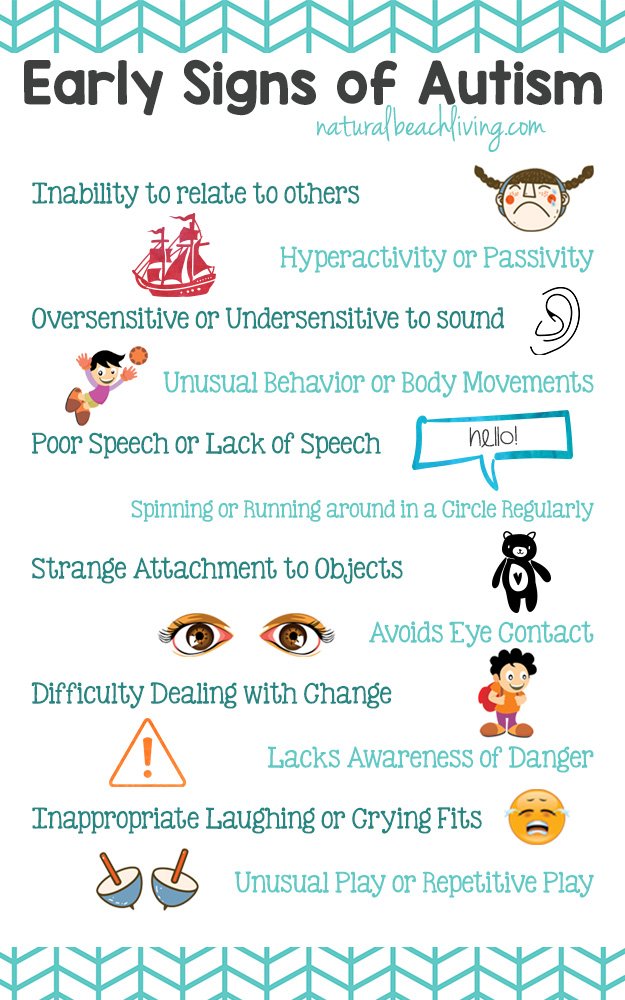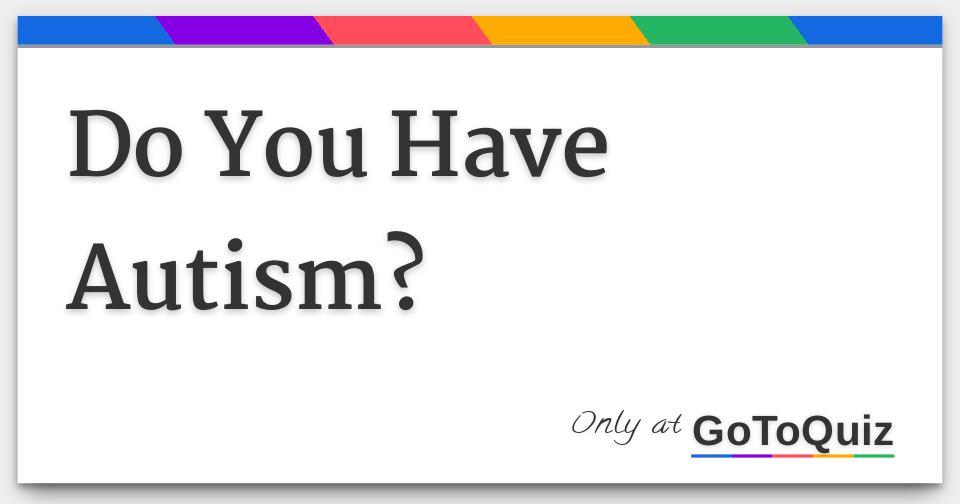How Is Autism Diagnosed
If someone is thought to have autism, their doctor will often refer them to a specialist, such as a psychiatrist, paediatrician or psychologist, to confirm the diagnosis.
The specialist uses a set of standard tests to make a diagnosis. To be diagnosed with autism, someone must have lasting difficulties in social communication and social interaction in multiple situations, as well as restricted, repetitive patterns of behaviour, interests, or activities. These symptoms must have been evident from early life and significantly affect the persons life.
Autism is classified into different levels:
- Level 1: people requiring support
- Level 2: people requiring substantial support
- Level 3: people more severely affected and requiring very substantial support
Children can usually be diagnosed at around 2, but sometimes symptoms are subtle and children are not diagnosed until they start school or even until they become adults.
Early Signs Of Autism In Preschool Kids
You may notice differences in your childs behaviors and communication right before they go to school. Some of these signs may mean that your kid is at risk for autism spectrum disorder. Here are some of the signs listed by CDC:
- Speaking less than 15 words
- Seeming confused by the function of everyday items
- Not responding to their name when called
- Not walking
- Has repetitive behaviors like rocking back and forth
Most girls show symptoms in infancy or early childhood. But they may not be recognized.
Some studies suggest that certain symptoms are seen more commonly in boys than in girls. Repetitive behaviors, for instance, may appear more often in boys. They are easier to spot.
In addition, girls deal with ASD differently than boys. They may hide their symptoms or spend more energy on adapting to social norms.
They are more able to form friendships. This may cause ASD to not be determined early on.
Challenging Behaviors In Autism
People with autism spectrum disorder may exhibit behaviors which put themselves at risk, cause difficulties for people around them or which are not socially acceptable.
Around 50 percent of people with autism engage in behavior that can cause themselves harm when they feel frustrated, overwhelmed or unwell. Such behaviors can include:
- Banging their head on walls or other objects
- Hitting themselves, e.g. hitting their head with their hands
- Poking themselves in the eye
- Pulling their hair
- Biting themselves
- Smearing feces
A person with autism who feels frustrated, overwhelmed or feeling unwell may also display physically aggressive behavior. This can include:
- Throwing objects
- Hitting, slapping or biting other people
- Pulling other peopleââ¬â¢s hair
Some people with autism eat objects that are not edible, or keep the objects in their mouth, a behavior known as pica. It is the most common eating disorder found in people with autism spectrum disorder. People may eat anything, including dirt or soap.
Recommended Reading: What Is The Life Expectancy Of People With Autism
What’s It Like To Have Autism Spectrum Disorder
A kid with autism might have trouble:
- talking and learning the meaning of words
- making friends or fitting in
- dealing with changes
- dealing with loud noises, bright lights, or crowds
Kids also might move in an unusual way or do the same thing over and over .
A kid with autism may have a little trouble with these things, or a lot. Some kids need only a little bit of help, and others might need a lot of help with learning and doing everyday stuff.
You Find It Much Easier To Be Alone

Autism in many forms is distinguished by feelings of social difficulty: not quite understanding, integrating, keeping up, or doing the “right thing” in social situations. Many autistics feel, obviously, that being on their own is a much easier option. Interestingly, some scientists believe that autistics could actually have originally been early “solitary foragers,”who survived in the wild on the strength of their attention to detail and ability to see patterns rather than their social ties. It’s still early days for that hypothesis, but it’s an intriguing idea.
Read Also: What Kind Of Autism Does Symmetra Have
Can You Be A Little Autistic
No, there is no such thing as being a little autistic. Many people may show some characteristics of autism from time to time. This may include avoiding bright lights and noises, preferring to be alone and being rigid about rules. This does not make them autistic.
However, a person can be mildly autistic. Mildly autistic people are unable to understand the body language or emotions of the people around them. However, they have normal intelligence and can carry their day-to-day activities.
Observing The General Characteristics
Also Check: What Is Pivotal Response Training For Autism
Signs Of Autism In Older Children And Teens
Although autism spectrum disorder can reliably be diagnosed from the age of two or three years old, many children do not receive a diagnosis until they are older. Milder symptoms in children with autism spectrum disorder who are higher functioning may not be recognized until they are in school.
Autism is a spectrum condition, which means that children will have different experiences of day-to-day living. Children who are more than five years old and on into their teenage years, who have mild symptoms and are towards the higher functioning range of the autism spectrum, may:
- Develop a narrow range of interests or obsessions with certain topics
- Engage in repetitive behavior such as hand flapping, twirling or snapping a rubber band
- Not make eye contact
- Use formal language rather than the slang of their peers
- Place great importance on routines and rules
- Develop strong preferences for certain foods, clothes or objects
Children who have more severe symptoms and are towards the lower functioning range of the autism spectrum may:
- Not use speech at all
- Become extremely distressed at changes to routine
- Exhibit challenging behavior, such as being aggressive or banging head on wall
- Need assistance with everyday living, such as bathing and dressing
- Engage in repetitive behaviors, such as rocking
- Insist on rules and routine
- Develop rigid preferences for certain foods, clothes or objects
- Need specialized diets
Youre Very Sensitive To Stimuli Like Sound
This is an interesting one, because it differs radically across the spectrum of autism, but its worth noting. What are called atypical sensory-based behaviors, or reactions to sensory stimuli that arent quite normal, are often a part of autism, with some people extremely sensitive to various sensations or sounds. Its not the same for everybody, though. Autism seems to cause problems in some people when it comes to interpreting and processing sensory information, to the point of causing confusion and pain: you may have difficulty remembering faces, and be either over- or under-sensitive to things like noise and smell. If people keep commenting that your reactions to these things are unusual, it may be a marker of something deeper.
Images: Pixels, Giphy
Read Also: Autism Visual Aids
What Does An Autism Diagnosis Mean For My Child
An autism diagnosis can result in some beneficial effects, but also comes with associated risks, disadvantages, and contraindications. Once your child is diagnosed with autism, you can expect your doctor to devise a specific treatment plan, comprised of therapy and/or medication to help your child function more easily in daily life. You can also seek specific guidance and support for your child to thrive at school. Despite these benefits, a diagnosis of autism also come with the risk of social stigmatization for the child. There is also a range of physical and mental-health conditions that frequently accompany autism including but not limited to: gastrointestinal problems, epilepsy, ADHD, anxiety, and depression.
Severe Or Level 3 Autism
Another way to describe severe autism is to talk about the level of support required for a person with the diagnosis to function safely. The current diagnostic manual provides three levels of autism, with more support required at each level.
People with severe autism would usually be diagnosed as having level 3 autism spectrum disorder, meaning they need a great deal of support.
It is not unusual for a person with severe autism to require 24/7 support and supervision.
Severe autism can be much more debilitating and challenging than other types of autism. That’s because people with autism have many of the same issues as anyone else on the spectrum, but to a much greater degree, and often have major symptoms that are relatively rare in higher functioning autism.
These two sets of issues can make it virtually impossible for a person with severe autism to function well in typical settings ranging from school to the grocery store to the doctor’s office.
Recommended Reading: Does James Holzhauer Have Autism
History Of Terminology For Mild Autism
Back in 1980, “infantile autism” was defined, in all cases, as a severe and disabling disorder. No one with an autism diagnosis would be expected to succeed in school, make friends, or hold down a job.
In 1994, “Asperger’s syndrome” was added to the Diagnostic and Statistical Manual of Mental Disorders . Those with Asperger’s syndrome were characterized as bright, verbal, and highly-functioning, while also demonstrating some autistic behaviors.
In 2013, the diagnostic criteria were changed again when the DSM-5 was published. Asperger’s syndrome is no longer a diagnosis. Instead, the manual provides just one diagnosis for all people with autismautism spectrum disorder . People with autism spectrum disorder may or may not have severe speech delays, sensory processing challenges, specific types of behaviors, or other symptoms.
While people with autism spectrum disorder typically have problems with social communication, these problems range from the extreme to the relatively mild .
Now, a diagnosis of ASD includes a “level of support” from 1 to 3, with 3 describing people who need the most support. However, describing someone as having “Level 1 autism” has not really caught on. Many people have continued to use the term “Asperger’s syndrome,” but even this term doesn’t correlate exactly to high-functioning or mild autism.
High Functioning Autism Symptoms

- Fixation on Particular Subjects or Ideas
- Linguistic Oddities
- Development of Repetitive or Restrictive Habits
- Dislike of Change
- Focus on Self
- Unusual Movement Patterns
Diagnosis rates for autism continue to rise, especially as parents and professionals become more familiar with the symptoms of high-functioning autism. Many patients are getting the assistance they need to live full, productive lives because their unusual behaviors are no longer seen as simple social awkwardness or eccentricity. As more caring medical and mental health professionals learn to recognize the most common symptoms of autism, the number of interventions available to people with autism will rise.
You May Like: What Is The Life Expectancy Of People With Autism
Signs Of Nonverbal Communication Difficulties
- Avoids eye contact.
- Uses facial expressions that dont match what they are saying
- Doesnt pick up on other peoples facial expressions, tone of voice, and gestures.
- Makes very few gestures . May come across as cold or robot-like.
- Reacts unusually to sights, smells, textures, and sounds. May be especially sensitive to loud noises. Can also be unresponsive to people entering/leaving, as well as efforts by others to attract the childs attention.
- Atypical posture, clumsiness, or eccentric ways of moving .
Children with autism spectrum disorder have trouble picking up on subtle nonverbal cues and using body language. This makes the give-and-take of social interaction very difficult.
How To Help Any Autistic Behaviour That Occurs As A Child Becomes A Teenager:
- Take a calm, quiet approach when talking to the young person
- Give them their own space, while ensuring that they dont retreat from family life altogether
- Limit online activities to encourage face-to-face time with people
- Plan activities for weekends and holidays in advance and share those plans with the young person
- Keep to a routine
- When talking to your son or daughter, do so while engaging in a chosen activity, such as walking through the park or driving in the car with them as a front-seat passenger, rather than sitting looking at them
- Use lots of subtle and genuine praise, as children with autism generally have low self-esteem and need more genuine praise then neuro-typical children. But remember that many autistic children dislike being singled-out in front of others and praised
Read Also: Does James Holzhauer Have Autism
New Symptoms That May Appear During Adolescence
Autistic children can often find adolescence very difficult. Although they have the same hormones as all other teenagers, they dont naturally develop complex relationships and arent able to interpret or engage in the more types of relationships which develop as children get older. They can be prone to isolation and low moods, which can appear very intense and be difficult to read.
He May Become Distant
People with autism sometimes need a break from constantly being “on” around you. They also won’t want you to see these breaks and so they may become distant and spend time away from you randomly.
It’s not your fault. It’s just something that he has to do.
Intuitive Facilitator Joseph Stasaitis says, “I have found autistic folks to be quite empathetic. They may not express or exhibit their emotions freely, but this can be misinterpreted as not caring. The autistic person may then very well withdraw to keep safe. Although craving love and intimacy they tend to lack the ability to pick up on social cues.”
Don’t Miss: Can A Child Outgrow Autism
Check For Physical Issues
Few people with severe autism have the ability to describe physical symptoms or problems. Thus, it’s a good idea to start by checking whether a child with severe autism has physical symptoms that may be exacerbating problem behaviors.
It’s not uncommon, for example, to discover that a child’s apparently aggressive behavior is actually a response to severe gastrointestinal painpain which can be treated through dietary changes. Once the pain is gone, the person finds it much easier to relax, engage, learn, and behave appropriately.
Is There A Cure For Autism
No, currently autism has no cure. Early intervention during the preschool years can help the child manage their behavioral issues.
Treatment options include
- Behavioral therapy: This focuses on reducing problem behaviors. Children are taught how to behave in social situations and communicate better with others. It also involves counseling the parents and teaching them ways to reach out to their child.
- Educational therapies: Children with autism spectrum disorder respond well to highly structured educational programs. Successful programs consist of various activities to improve social skills, communication and behavior. Speech therapy to improve communication skills, occupational therapy to teach activities of daily living and physical therapy to improve movement and balance may be beneficial.
- Medications: Specific medications can help control symptoms such as hyperactivity, extreme anxiety and severe behavioral issues. Some kids may also have medical issues, such as epilepsy, poor sleep and constipation that need medical management.
Don’t Miss: What Is The Life Expectancy Of People With Autism
When Should I See My Doctor
Its important to seek help if you are concerned you or your child has autism. Early intervention offers the best outcomes, no matter what type of autism a child has.
There may be different signs of autism in different ages.
In the first year, a baby with autism might not be interested in other people and may not make eye contact with their parents. They may not smile or gesture like other babies.
As toddlers, children with autism might not respond to their name, or might focus on activities like lining up toys. They may not be interested in playing with other children or might speak in a monotone way.
Older children with autism might have difficulties in social situations, following instructions or making friends.
Sometimes people are not diagnosed with autism until they are adults. They may spend their lives feeling like they dont quite fit in. They may have difficulties with relationships, work and social situations. They may also have mental health conditions like anxiety or depression.
Autism Awareness Australia provides information about signs of autism in people at different ages.
Dont Miss: Dog Breed For Autistic Child
Autism Quiz: Could Someone You Know Have Symptoms

Do you think someone you know may be autistic?
Autism spectrum disorder, often just called autism, is typically diagnosed in younger children at 9, 18, and 30 months during well-child visits. But autism can be diagnosed in older children, adolescents, and adults.
We created this brief test to help you determine if someone you know a friend, partner, spouse, or other loved one may benefit from being screened or evaluated for autism.
This test will help measure if they have any autism-related traits based on your observations or their own self-assessment.
If you think someone you know may be autistic, consider talking with them about getting evaluated by a doctor or autism specialist, who can use a variety of screening tools and clinical observations to make an accurate diagnosis.
If you think some of these questions describe how you feel and behave, consider reaching out to your physician or family doctor who can refer you to a specialist for an evaluation, if needed.
This online screening is not a diagnostic tool. Only a trained medical professional, like a doctor or mental health professional, can help you determine the next best steps for you.
This quiz cant replace a clinical diagnosis. If you believe someone you know might have autism spectrum disorder or another condition after taking this test, consider reaching out to a qualified professional.
Read Also: Best Dogs For Autistic Child